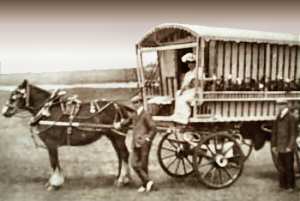A Rare Breed of British Origin
Gypsy Cobs were traditionally used to pull the heavy covered wagons of travelling Gypsies in Great Britain, especially during the nineteenth and twentieth centuries. Historic pictures of these times show that the Gypsy  horse was much taller in statue with less feathering or mane than the Gypsy Cob of today, and if anything resembled more of a Clydesdale, with a larger head and general size.
horse was much taller in statue with less feathering or mane than the Gypsy Cob of today, and if anything resembled more of a Clydesdale, with a larger head and general size.
However, with the advent of motor vehicles, certain families in the past 50 years began selectively crossbreeding their Cobs with smaller pony breeds to bring down the size and increase the feather. The results of this careful breeding has resulted in a pony size cob between 13-15 hands, with a small refined head, petite ears and heavy bone, coupled with a short, compact body, a long flowing mane and tail, and most importantly, lots of feather starting from the knees down and covering the hooves. What they have created is very distinct from the Gypsy Cob of the past and the trend now with the Gypsies is to breed down to 12-13 hands.
The most common colour of the Gypsy Cob is the traditional black and white piebald; however they come in all colours from appaloosa to bay, chestnut, silver dapple and even champagne and pearl. Like many of the larger draught breeds they are slow developers and do not stop growing until 5-7 years of age. They are extremely hardy and easy to care for and have proven to excel at every discipline imaginable in the equine world.
There are still a variety of types of Gypsy horses being bred in Great Britain, Europe and now the United States, and these have been given several different names such as Irish Tinker, Trade Cob, Traditional Cob, Gypsy Vanner, Gypsy Cob, Irish Cob and Romany Horse. All these names are used to describe the type of horse which the Gypsies have bred and used in the British Isles for generations. One of the first American importers trade-marked the name “Gypsy Vanner” in an attempt to differentiate between the traditional trade cob from the past and today’s redefined Gypsy Cob. The name Gypsy Vanner has caught on with much popularity in the United States and the world over, and has also caused a lot of confusion as to what is what, but either name is correct for this horse.
The first Gypsy Cobs were imported from Great Britain into New Zealand in 2005 and as of May 2008 there were only 11 of these horses in New Zealand and about 25 in Australia, with a few studs establishing the breed down under.
Gypsy Cobs are particularly a great breed for the learner or for people who have lost their confidence, as they have the most amazing temperament and are one of the most honest, hard working and “gentle” breeds of horses in the world today. If you are looking for a horse that is known for soundness and sanity with exquisite beauty, that will be a faithful, versatile companion to your family, then the Gypsy Cob may just be the perfect horse for you.